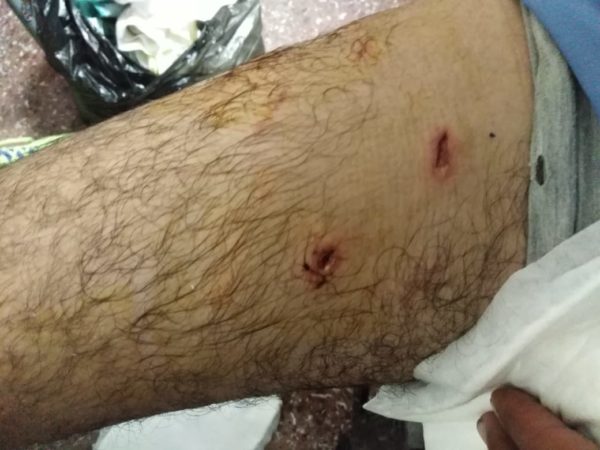I SAID JUST LEAVE ME TO DIE HERE, WHATEVER, I DON'T CARE ANY MORE
| 26.09.2019 | Nearby Gevgelija train station | Philoxenia | 41.1434238, 22.5127251 | North Macedonia | Greece | yes | no | yes | no | no | no | no | 21 - 23 | 2 | Morocco | fingerprints taken, photos taken | unknown | beating (with batons/hands/other), threatening with guns, dog attacks | Officers wearing civilian clothes; North Macedonian police officers |
The respondents, aged 21 and 23 years old, both from Morocco, began their journey on the 26th September 2019. They boarded a train from Thessaloniki and crossed the Greek-North Macedonian border. In North Macedonia, shortly after passing Gevgelija train station, the respondents were stopped in an abandoned train station where they were apprehended by police. The respondents described these police officers as wearing civilian clothes, not uniforms. They recounted how some people who had been apprehended on the train attempted to run, but were chased. The officers informed the respondents that nothing would happen to them, and that they would be sent to a camp in Serbia.
One of the officers threatened to hit the two respondents with a stick, but was dissuaded by the others and sent to chase those who ran away and beat them instead. The respondents were put in a closed car and were unable to see where they were being taken. Eventually they reached a police station, but both respondents were unsure of the location. They were then fingerprinted, photographed, placed in a car, and taken back to the Greek-North Macedonia border. Before the officers left the group at the border, they hit them with their fists. The two respondents then made their way back to an abandoned train station where they paused for a rest and some food. Again, a police car approached them, the officers in the car were described by the respondents as wearing dark blue shirts, black trousers, and badges with the Macedonian flag on their shoulders. Shortly after the car arrived the officers from the vehicle released four dogs on the respondents. At first they attempted to run, but quickly saw this would be impossible. "At that point we couldn’t run anymore so we stood around each other in order to keep the dogs away from us and they were running around us in circles." One of the respondents was dragged away from the group by the dogs after being bitten on the thigh. The other respondent attempted to hit the dog with a stick to distract it from attacking his friend. The dog reacted by then biting the second respondent."They were wearing shorts and flip flops at the time when they stopped us and one of them was really drunk and they were smoking."
[caption id="attachment_13592" align="aligncenter" width="600"]‘As that dog bit me, I felt as though there was a knife going into my thigh and I felt his fangs crushing and entering my flesh…The strangest thing I saw was that the dog owner was just watching the dog bite me as though it was some enjoyable thing to watch’
 Puncture wounds from dog bite inflicted by North Macedonian police K9 unit.[/caption]
The officers, watching this, released another two dogs on the respondents. By this point, the respondent describes begging the owner, saying "please please get the dog away from me". Once the dogs were recalled, one of the officers approached and hit the respondent who had beaten the dog. He hit him three times with his fist, until the respondent was unconscious. The officer repeatedly asked the respondent why he had hit the dog.
The respondents described the scene, saying there was blood everywhere and one of the respondents was crying, believing he had lost his leg. They were put in a van and driven to a point "in the middle of nowhere", where the officers left them on the side of the road, telling them to follow the road until they reached Thessaloniki.
Puncture wounds from dog bite inflicted by North Macedonian police K9 unit.[/caption]
The officers, watching this, released another two dogs on the respondents. By this point, the respondent describes begging the owner, saying "please please get the dog away from me". Once the dogs were recalled, one of the officers approached and hit the respondent who had beaten the dog. He hit him three times with his fist, until the respondent was unconscious. The officer repeatedly asked the respondent why he had hit the dog.
The respondents described the scene, saying there was blood everywhere and one of the respondents was crying, believing he had lost his leg. They were put in a van and driven to a point "in the middle of nowhere", where the officers left them on the side of the road, telling them to follow the road until they reached Thessaloniki.
Eventually another police car passed the respondents. The respondents waved them down but the police simply checked their papers and left, telling them to follow the road to Thessaloniki. At this point, the respondents decided to begin walking."We were in the middle of nowhere, we were in the dark, we had no idea what to do."
Eventually the respondents reached a small village where some local people treated them with alcohol and Betadine, and called an ambulance. In the hospital in Thessaloniki, the respondents were asked for money to treat their wounds. As they had nothing to pay with, the hospital staff simply cleaned the wounds, bandaged them, and told the respondents to leave."My friend was crying all this time as he didn’t know if we would survive this or not. And I said 'just leave me to die here whatever, I don’t even care at this point'. But he said no and dragged me and made me stand"
